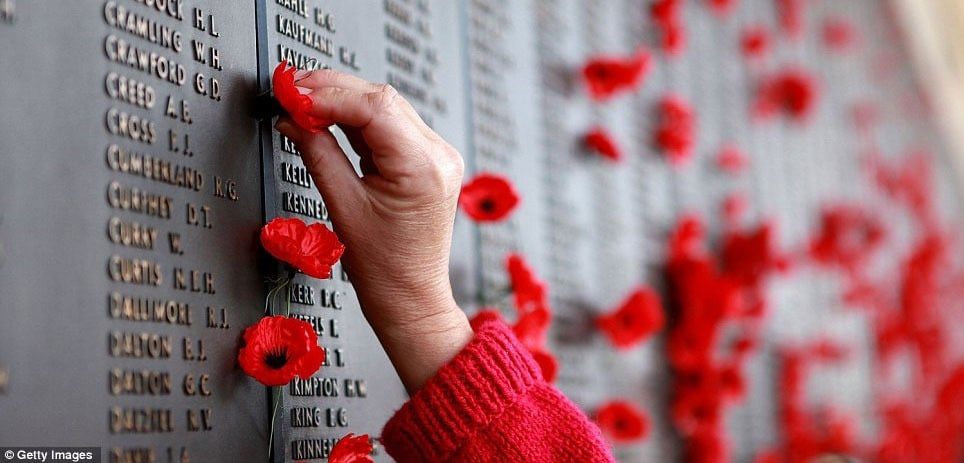In 2012, the Manchester United midfielder, Nemanja Matić, received death threats for refusing to wear one.
In 2016, the national football teams of Wales, England, Scotland and Ireland were all given fines by FIFA for displaying them.
This year, a multi-coloured glittery one had to be taken off eBay in response to a tirade of vitriolic (1) comments about it.
What is this divisive symbol, which every year stirs up a swirling mass of controversy?
The answer may surprise you.
It is a small, red poppy.
What does the poppy stand for?
According to the armed forces charity The Royal British Legion, the poppy is a symbol of remembrance. It serves to commemorate the British servicemen and women who have died in war. The poppies, which are worn on your clothes, have been sold by the organisation since 1921. They are worn every year in the run-up to and during Remembrance Day.
The poppy was chosen as the symbol for remembrance, as these hardy but beautiful flowers were the only thing to grow in the battlefields of France and Belgium during the First World War. The sight of these flowers growing against all odds (2), surrounded by destruction and decay (3) inspired the poem “In Flanders Fields” by the Canadian soldier John McCrae in 1915.
What is Remembrance Day?
Every year, on the second Sunday of November, the British public come together in a day of remembrance for those who have died in wars. Ceremonies are held at churches, cenotaphs (4) and war memorials in towns, villages and cities all over the country.
This tradition began in 1919 and was initially intended to commemorate the British soldiers who died fighting in the First World War. The first day of remembrance was known as Armistice Day and was held on the morning of the 11th of November, exactly a year after the signing of the peace treaty, which had ended the war.
In my hometown, Remembrance Day is an important event and the majority of the town’s population make their way into town to pay their respects. A procession (5) led by the silver band, followed by the town’s local organisations and youth groups winds its way through the lanes, ending at the war memorial, which stands proudly in the centre of the town.
The ceremony itself involves a reading by the town’s vicar (6) and the laying of many poppy wreaths on the memorial by the people of the town. Shortly before 11 am, a local girl or boy plays the piece, The Last Stand on a trumpet or cornet. Following this, the whole town falls silent for two minutes of remembrance.
The whole affair is simple, respectful and thought-provoking. It gives a chance for the town to reflect on the lives lost by so many of the town’s young people, particularly during the two world wars and the message usually focusses on the sentiment (7) ‘never again’. The day also serves to bring the community together.
Why is the poppy controversial?
There are various reasons for why some people choose not to wear the red poppy. For some, the flower symbolises a glorification of war. It’s common consensus, nowadays, that Britain’s involvement in especially the Second World War was justified. It is seen as being a necessary evil to prevent a greater evil. However, the public is far less supportive of more recent conflicts. Many people, therefore, do not wear a red poppy because they believe that not all wars are just and to show their objection to the government’s decision to enter into certain more recent conflicts.
Others object to the fact that the red poppy is only to commemorate British military and not civilian victims of war or soldiers from other countries. They may, therefore, choose to wear a white poppy instead. White poppies, which are a symbol of peace, have been sold by the Peace Pledge Union since the 1930s. They are designed to commemorate people, both civilian and soldiers, and from all countries who have died in conflict.
Another main objection to the poppy is that it is seen to be overly politicised. FIFA’s decision to fine Britain’s national football teams in 2016 was based on the assumption that the poppy is a political symbol. Under FIFA’s rules, displaying political symbols is an offence. The association have since reversed their decision but the debate about the political status of these flowers rages on
Conclusion
Every year, as November rolls around, the discussions surrounding Remembrance Day and poppies starts anew and every year, some people bemoan (8) this discussion. However, in my opinion, it’s precisely this debate, which keeps these traditions relevant in the modern world.
It has been over 100 years since the war that was meant to ‘end all wars’, devastated Europe and claimed the lives of so many people. No one who fought in that conflict is still alive, yet every year, through Remembrance Day and poppy wearing, we have the opportunity to examine and learn about, not just our history but also the role of our country in modern-day conflicts.
Whether we choose to wear a red poppy, a white poppy or no poppy at all, it is still important to learn about our country’s role in past and present-day conflicts. By engaging critically with the debate, we can hopefully learn how to avoid the mistakes of the past and forge a more positive and peaceful future.
Dictionary
(1) Vitriolic – criticising someone in a very severe and unpleasant way
(2) Against all odds – If you do or achieve something against all odds, you succeed although you were not likely to
(3) Decay – to gradually become bad or weak or be destroyed
(4) Cenotaph – a public monument (a special statue or building) built in memory of particular people who died in war, often with their names written on it.
(5) Procession – A line of people or vehicles that moves forward slowly as part of a ceremony or public event.
(6) Vicar – a priest in some Christian churches
(7) Sentiment – an opinion that you have because of the way you feel about something.
(8) Bemoan – to complain or express sadness about something.
Cambridge learner’s dictionary https://dictionary.cambridge.org/dictionary/learner-english/
Quiz
[wp_quiz id=”12851″]












Leave a Reply